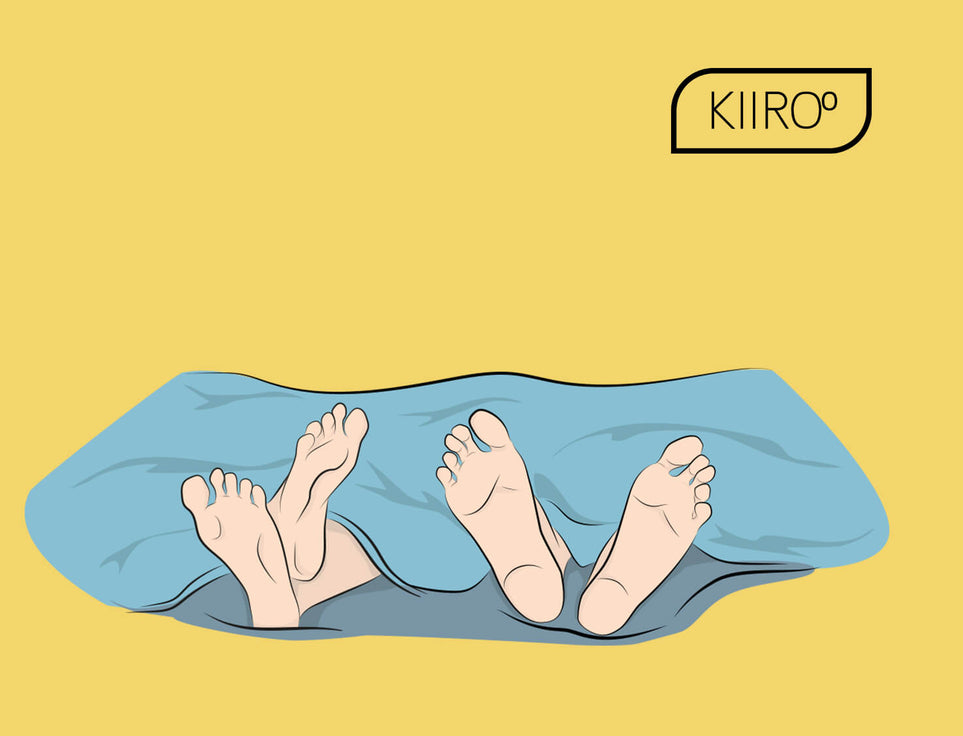Masturbation and Partnered Sex
Have you been noticing that your solo sex play consistently delights but your partnered play feels frustrating or unsatisfying? If we’ve always masturbated in the same way, there’s a chance that we’ve developed habitual patterns of experiencing pleasure.
Our bodies can become accustomed to particular types of touch that narrows our ability to attend to a fuller range of sensations. Difficulties with arousal, desire and orgasm may arise when we over rely on the same solo method.
Great for perfecting our technique but not so great for exposing us to the different sensations experienced with a partner. While masturbation has many great benefits, we don’t want it causing problems either!
In this article, I will highlight eight physical and psychological factors around solo play that you can examine further. As you read, ask yourself, “How flexible am I with this factor during solo sex?” If your answer is “very little” or “not at all,” use my suggestions to find your own ways to mix things up.
Physical Factors
1. Duration - Giving yourself a quickie may have been your only option due to a lack of time or privacy. If so, don’t be surprised when going quickly with a partner ends in dissatisfaction.
Our partners likely have very different arousal and orgasm trajectories that don’t line up with our finely tuned technique. While the destination may be enjoyable to reach, it might not leave enough time for all passengers to enjoy the ride.
On the other hand, edging yourself towards orgasm may create a whole other concern. Taking too long may test your partner’s capacity to endure rather than to purely enjoy themselves.
2. Tempo - Tempo refers to strokes per second. Do you keep the same tempo from beginning to end or do you start slow and end fast, or start fast and end slow?
Due to something called habituation, our ability to perceive pleasure may actually diminish with repetitive stimulation. Fortunately this is not a permanent problem but one that can be addressed by simply varying the tempo during solo or partnered play!
3. Grip/hand position and pressure - Does your solo play only involve heavy pressure or a tight squeeze, aka The Death Grip? If so, it may be challenging or impossible for a partner to replicate that using only their body.
Experiencing a variety of hand positions and pressures can help us stay focused on milder but still pleasurable sensations. Otherwise, when with a partner we can get lost in our heads worrying whether we will be able to stay aroused.
4. Toys, props, and materials - It’s common during solo experimentation to stumble upon a certain fabric, object, or sex toy that introduces our genitals to a unique sensation. If we become dependent on a favorite toy because of the unique type or intensity of stimulation, this may be the ONLY way we learn to experience pleasure.
I’m not suggesting taking away your precious sex toy, just mix in some other methods occasionally. By varying the type and intensity of sensation, you experience a broader range of stimulation that better generalizes to partnered sex.
Psychological Factors
Hopefully by now you’ve realized the importance of exposing yourself to a variety of sensations. This can open your mind and body to noticing and enjoying the broader range of physical stimulation generated with a partner.
The next set, psychological factors, also involve the impact of solo play on sensation. Each of these can either inhibit or distract us from our ability to stay relaxed and mentally focused on partnered pleasure.
1. Vocalizations - Sometimes we inhibit our full expression of pleasure by silencing ourselves out of shame or embarrassment. Family or roommates sometimes necessitate pleasuring ourselves quietly.
However, allowing ourselves to moan, groan, talk dirty, scream, or just generally be loud can actually enhance our experience of pleasure. Whether because we permit ourselves to let go of inhibitions, whether it charges up our imagination. Or whether just allowing ourselves to breathe more fully, it’s worth experimentation!
2. Urgency - Urgency is the psychological state of believing that it’s necessary to save time by getting to the point as quickly as possible. Like being too loud, sometimes living with others forces us to have sex stealthily.
This means hurrying, rushing, and generally not paying as close attention to the sensations being generated. This may keep us out of step with our partner as well as actually diminish enjoyment of our own pleasure. The antidote? Slow down. Breathe. Repeat.
3. Mood - As with our sense of urgency, we may be in an emotional state that makes it difficult to relax and stay focused with a partner. Furthermore, we may have found that masturbation may be the only thing that makes us feel better.
But unless we’re aware of our moods and their sexual impact, a negative mood can wreak all kinds of havoc. Remember that while a particular mood may be motivation to find relief through solo play, the same mood may actually inhibit our partnered play. Check your mood!
4. Visual or fantasy stimulus - To expedite our solo play, many of us fantasize or watch porn to facilitate arousal and orgasm. Whether fantasizing about a threesome or watching tall blonde park ranger porn, having a visual dimension can really move things along.
If porn or fantasy have always been present during masturbation, we may have learned to over-rely on the power of our erotic imaginations. In turn, our ability to tune in to the more subtle and varied sensations of partnered sex may have been sacrificed. If needed, try focusing solely on the physical sensations of self touch, or at the very least, vary your reliance on visual or fantasy scenarios.
During solo sex we control all the variables that maximize sensation and the focus is always on our pleasure. Introducing a partner removes much of that control, requiring us to be flexible and to adapt.
If we’re doing great with solo sex but partnered stimulation leaves us wanting, check your solo habits for patterns and inflexibility. Afterwards, share your discoveries with a partner. Having an open and honest conversation about your sexual experiences, including masturbation habits may be just the recipe for improving your partnered sex.
Want to get closer with your partner and build on your relationship? We got some tips for you!
SCIENCE AND RELATIONSHIPS
When it comes to relationships, how many of us can honestly say we know what we’re doing? Most of us are simply going with the flow. There’s no textbook you’re given when you enter a relationship. Instead, we watch soap operas and observe the relationships around us, putting the pieces of the puzzle together. Though this helps us greatly, there are other ways to see what makes a relationship work.
This is where science comes into play. The beauty of science is it applies to everything, including relationships. Now, more studies are coming out with information to help individuals and couples improve their relationships on multiple levels.
Though you wouldn’t think science has a lot to do with love, it does. If you’re interested in finding out the scientific ways to create a stronger healthy relationship, well, here they are.
1. REDUCE STRESS
Now, I’m not going to tell you to “get rid” of stress. It’s impossible. You’ll never be 100% stress-free. Even if you live in the middle of nowhere, away from civilization, you’ll still experience stressful situations. So, let’s all accept that stress is a part of life.
But, this doesn’t mean you shouldn’t try to reduce the amount of stress in your life. In a study from the University of Texas, shows that cortisol, the stress hormone, is linked to a decrease of desire, sexual arousal, and satisfaction. Whether it’s practicing self-care or cuddling with your partner after work, these little things will help reduce stress and improve your relationship.
2. KEEP THE CONNECTION STRONG
This is one of the most important components of a healthy and strong relationship. If you want to have a vibrant and long-lasting relationship, there needs to be a strong emotional connection. Many of us withdraw ourselves when we’re stressed or sad. However, what happens is it creates an emotional disconnect between you and your partner.
Do you always want to talk about your feelings? Of course, not. Sometimes you just want to take a bath and go to bed. But strong relationships are ones which are based on communication.
3. START KISSING
You’ll probably love this one! But it’s true. Kissing releases dopamine and this little hormone can help with a multitude of things. Not only does dopamine reinforce positive feelings of attachment, but it also boosts your immune system, and introduces your smell and taste to your partner.
Not to mention it also reduces stress and makes you feel good. So, if you want a stronger romantic relationship, you’re going to have to kiss more. It’s that plain and simple.
4. GIVE THEM THE EYE
Not in a creepy way. I’m talking about genuine eye contact. Everyone always seems to ignore the importance of eye contact, but we all seem to use it when it comes to non-verbal communication. You probably already used eye contact to communicate a message to your partner today. See?
It’s something we do daily. In Psychology Today, it was found that eye contact while listening sends our partners a signal of connection, support, and care. The next time your partner is talking to you, put your phone down and look at them. This one small move holds great power.
5. LISTEN TO BOTH YOUR HEAD AND HEART
Everyone always posts inspirational quotes about “following your heart,” but when it comes to love, I wouldn’t take that so seriously. When it comes to love, you need to use both your heart and brain. It’s easy to let your emotions get the best of you. If you’re jealous or angry, it’s easy to let your heart get in the way.
But this is when you need to use your brain. You can avoid unnecessary fights just by taking a moment to think. Our lives aren’t chick-flicks. Some of our actions can create a destructive path to a breakup. By developing self-control, you’ll be able to reduce conflict and allow forgiveness.
6. PUT THE PHONE AWAY
I hate to be the bearer of bad news, but using your smartphone in bed is doing more than making you addicted to Instagram or Facebook. It’s also weakening your relationship. Firstly, our phone emits blue light which affects our sleep cycle. This could be the reason why you’re tired throughout the day. And when you’re tired, you can’t give your partner the attention you need.
Secondly, your smartphone isn’t connected to your partner. You’re spending time focusing on other people’s lives rather than your own. Intimacy is crucial in a relationship. Even if you just cuddle or talk in bed with the lights off, these small things matter.
The quality of your relationship can influence your entire life. It’s not just about being happier; it’s also about improving the quality of your life with your partner by your side. Now, I’m not saying working on your relationship will be easy. It’s going to be a lot of work. But, the effort will definitely pay off in the long term.
Written by
Korey McWilliams

































